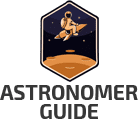Have stars, planets, black holes, meteors, and other celestial objects always piqued your interest? Do you find yourself most of the time staring at the beautiful sky at night, wondering what is out there? And you wish you could travel between galaxies?
If that’s the case, this article is for you. For a few “freaks” who should look beginning to learn about astronomy or maybe even becoming an astronomer. But You will need to complete a few crucial steps, whether you want to work in a local laboratory or NASA with some of the country’s top astronomers.
Contents
What is Astronomy actually?
The first thing you need is to understand what astronomy really means. Simply, Astronomy is the study of everything past Earth’s atmosphere in the cosmos. This covers elements visible to the naked eye, such as the Sun, Moon, planets, and stars. It also contains faraway galaxies and small particles that can only be seen using telescopes or other devices. It also covers inquiries concerning things we can’t see, like dark matter and dark energy.
What Does Being an Astronomer Mean and what they Do?
Astronomers explore, investigate and analyze the universe using many disciplines such as physics, geology, chemistry, biology, mathematics, geometry, and logic, and special hardware to better deeply understand anything from black holes to planets and stars. Astronomers are frequently part of vast groups of scientists that gather, document, and publish their results in an office or an observatory. Most astronomers specialize in one of several fields, such as planetary physics, quantum mechanics, celestial bodies, stellar phenomena, the history and future of the cosmos, or the study of the sun.
You might imagine an astronomer as someone who is just using a telescope to collect data about celestial objects. Those are indeed called astronomers, and they do just that. However, they are but a type of astronomer called Observational Astronomers. There are many various types of astronomers! Do you enjoy manufacturing and designing things, or maybe you like making things work? You are good at coding and writing computer programs; do you enjoy calculating and resolving formulas. These are also tasks an astronomer can and must do. Working to discover what lies out there in space requires a massive team of competent and skilled people in many science branches.
How To Start Learning Astronomy?
Do not get worried because you do not need much experience or a special telescope or other equipment to get started with stargazing or amateur astronomy. and you can do it practically anyplace. Of course, some places are better than others for sighting particular celestial objects. However, you can do it almost anywhere, from your apartment’s window, your house’s balcony or rooftop, or a rural area. What matters is that you have a clear view of the sky. There is so much to see out there by using plenty of methods. whether you use a smartphone application, binoculars, a telescope, or just with your bare naked eyes.
Since astronomy may be a natural passion, the ideal way to approach this activity is to step outside at night and learn and discover the names and patterns of the stars and celestial objects out there in the sky. There’s more to see up there than you may think, even if you live in a heavily populated, light-polluted region. The ability to glance up and say, “There’s Venus” or “That’s Jupiter” will provide you with a tremendous amount of joy for the rest of your life.
It is not just about viewing and looking for planets or stars. Because you can also use the sky to get yourself oriented. Use the stars in the sky to learn where the north, south, west, and east are.
Here is a short video to help Find North using the Stars.
There are several ways to take in the marvels and wonders of the universe from Earth, whether by sighting and spotting planets with the naked human eye or by detecting and locating galaxies using a telescope.
Pick Your Best Astronomy Tool
Exploring the sky and being an amateur astronomer doesn’t always mean that you have to work with a telescope. It is a passion and you have to use whatever equipment you can feel comfortable with.
A decent and good smartphone application is one of the most valuable pieces of equipment for observing and exploring the sky these days. This software can tell you what is visible and where to gaze from your location on a particular date. There are plenty to choose from, and the best are updated regularly by their inventors to ensure that information is accurate and recent.
Binoculars are also a good tool for exploring the sky. They provide a broad and vast visual field, making it simple to navigate.
A higher-powered telescope magnifies just a tiny, difficult-to-find patch of sky.
They also display a vision upside down and straight in front of you, making it simple to see where you’re aiming. The view via an astronomical telescope, on the other hand, is frequently upside down, occasionally mirror-imaged, and always at right angles to the direction you’re pointing.
However, if you want to buy a telescope, feel free to read this article about Best Telescope For Viewing Planets.
The binoculars are the next level up from naked-eye astronomy. Although astronomy-grade binoculars are available, they are not essential. Binoculars will allow you to view the craters on the Moon, the moons of Jupiter, and the reddish Mars. They’ll also let you see faraway planets like Neptune and Uranus, which are usually invisible to the human eye.
Binoculars are very inexpensive, more accessible, and easy to transport and store.
Read this article to know which are the Best Astronomy Binoculars to buy.
Conclusion – Enrich Your Astronomy Knowledge
The intellectual discovery and comprehension of the mysterious night sky are the delights of astronomy. However, you must make these discoveries and acquire this information on your own, which is not always easy.
One of the most potent instruments for novices in astronomy is the public library where you can find books about astronomy for beginners.
Examine the astronomy shelf for publications that will provide you with the essential information you want, as well as guides to what you may see out there in the vast universe. Read about the stars and constellations you can see with your naked eye, as well as how they vary throughout the night and seasons.
Here is a list of the top 5 astronomy books for beginners:
- NightWatch by Terence Dickinson
- Turn Left At Orion by Guy Consolmagno & Dan M. Davis
- The Backyard Astronomer’s Guide by Terence Dickinson & Alan Dyer
- 50 Things To See With A Small Telescope by John A. Read
- Astronomy: A Self-Teaching Guide by Dinah L. Moché
You can also look for astronomy classes that are physically close to you or online introductory astronomy courses.
Here is a list of 5 astronomy online courses:


